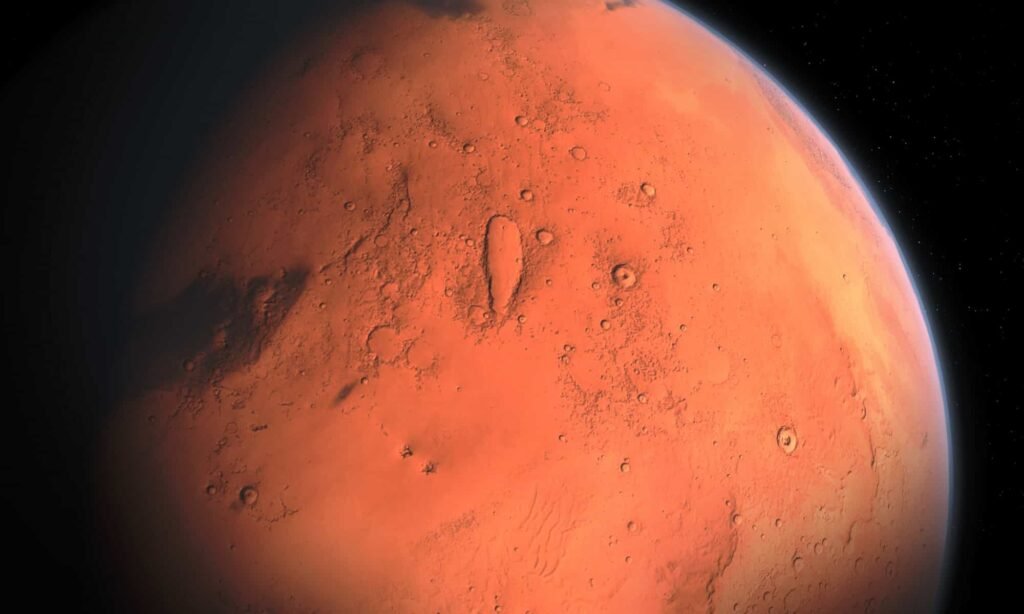Mars is the fourth planet from the Sun in our Solar System. It is often referred to as the “Red Planet” due to its reddish appearance, caused by iron oxide on its surface. Mars has captured the interest of scientists and space exploration enthusiasts as a potential candidate for human colonization in the future.
The planet has a thin atmosphere, with surface features including large volcanoes, valleys, deserts, and polar ice caps. Ongoing missions and scientific research continue to expand our understanding of Mars and its potential for future exploration.
Some people say the human species came from Mars before having settled (and thus bio-engineered life forms already here) on Earth and now intends to “return home” to Mars. Others argue, humans have evolved from single cell organisms right here on Earth and now “reach out for the stars” with Mars possibly just being a first destination to settle on other planets.
In a paper titled The Philosophical Transactions, Sir William Herschel described the many similarities between his own planet and Mars. Because Mars was so much like Earth, Herschel was convinced that the red planet teemed with populations of living creatures. Some scientists shared his viewpoint, while others thought it was nonsense.
“The analogy between Mars and the Earth is, perhaps, by far the greatest in the whole solar system. The [daily] motion is nearly the same; the [slant] of their respective ecliptic, on which the seasons depend, not very different; of all the superior planets the distance of Mars from the sun is by far the nearest alike to that of the earth; nor will the length of the [Martian] year appear very different from that which we enjoy.”
– Sir William Herschel
The Vision for Mars Colonization
Colonizing Mars has vast implications beyond exploration, raising ethical, scientific, and socio-economic issues.
- Ethical concerns focus on preserving Mars’ environment and ensuring responsible colonization to avoid irreversible damage to its ecosystem.
- Scientific breakthroughs could arise from studying Mars’ geology and potential past life, benefiting Earth. Research on Mars may foster innovations in biotechnology, engineering, and environmental science, enhancing our understanding of life’s origins and sustainability.
- Socio-economic impacts include new industries, such as space tourism and extraterrestrial resource extraction, leading to shifts in global dynamics and stimulating job creation and international collaboration.
- Culturally, Mars colonization redefines human identity and fosters a unified cosmic existence. This endeavor invites us to explore new philosophies and perspectives, embracing a future where humanity thrives as an interplanetary species.
As we consider establishing a human presence on Mars, we must ensure responsible colonization to avoid irreversible damage to its ecosystem. This united effort signifies a leap towards humanity as an interplanetary species, embracing the unknown and showcasing human innovation and resilience.
The Challenges of Mars Travel
Traveling to Mars presents technical, physiological, and psychological challenges. The journey takes six to nine months, requiring meticulous planning and life support systems for oxygen, water, food, and waste management. Engineers and scientists focus on innovative methods to recycle resources, emphasizing sustainability in extraterrestrial habitats. Radiation exposure is a critical danger, with researchers exploring shielding technologies to protect astronauts from cosmic rays and solar particle events. Solutions include materials with high hydrogen content and constructing living quarters underground to minimize radiation exposure on Mars.
The physiological effects of prolonged weightlessness, such as muscle atrophy and bone density loss, complicate the journey. Exercise regimens and nutritional strategies are developed to counteract these effects, promoting better health during and after the mission. Psychological strains from isolation within the confined spacecraft environment are also significant. Crew members must contend with limited social interaction and the stresses of confinement. Measures such as virtual communication with families, structured daily routines, and opportunities for recreational activities are essential in addressing mental health during the voyage. The development of artificial gravity technologies could further help mitigate the effects of prolonged weightlessness. Additionally, fostering strong interpersonal dynamics among the crew is critical to maintaining morale and cooperation during the mission.
Overall, the challenges of traveling to Mars require comprehensive solutions across multiple domains to ensure the safety and well-being of astronauts, making the mission a formidable yet achievable endeavor.
Technological Innovations for Mars Exploration
Human exploration of Mars requires groundbreaking advancements in rocket technology, space habitats, sustainable energy, and robotics. Innovations like ion propulsion, reusable rockets, inflatable habitats, and 3D-printed structures enhance mission viability. Solar and nuclear energy provide reliable power, while robotics and AI ensure mission success and astronaut safety. These technologies form a comprehensive framework supporting the journey to Mars, making human exploration a tangible reality. The integration of these advancements not only makes missions more feasible but also showcases human innovation and resilience in the face of challenges.
As we develop these technologies, we are paving the way for a future where humanity can thrive on Mars and beyond. Establishing a human presence on Mars will require continuous innovation and collaboration across multiple domains, ensuring that we can overcome the formidable challenges and make the vision of Mars colonization a reality. This endeavor represents a significant leap for humanity, pushing the boundaries of our capabilities and expanding our horizons to new frontiers.
Related Links
- Human Mission to Mars
- Why Humans Aren’t There Yet
- NASA Mars Exploration Program
- Elon Musk’s PDF: Why Mars? (40MB)
- Mars, The 4th Planet From The Sun
- Marspedia: Human Settlement
- Problems In Space Exploration
What’s More
The posts in My Blog feature reflective, story-driven pieces rooted in personal and societal insights.
The topics in My Interests explore abstract, philosophical ideas and their cultural and societal impact.
👁️ 8,240 Views














